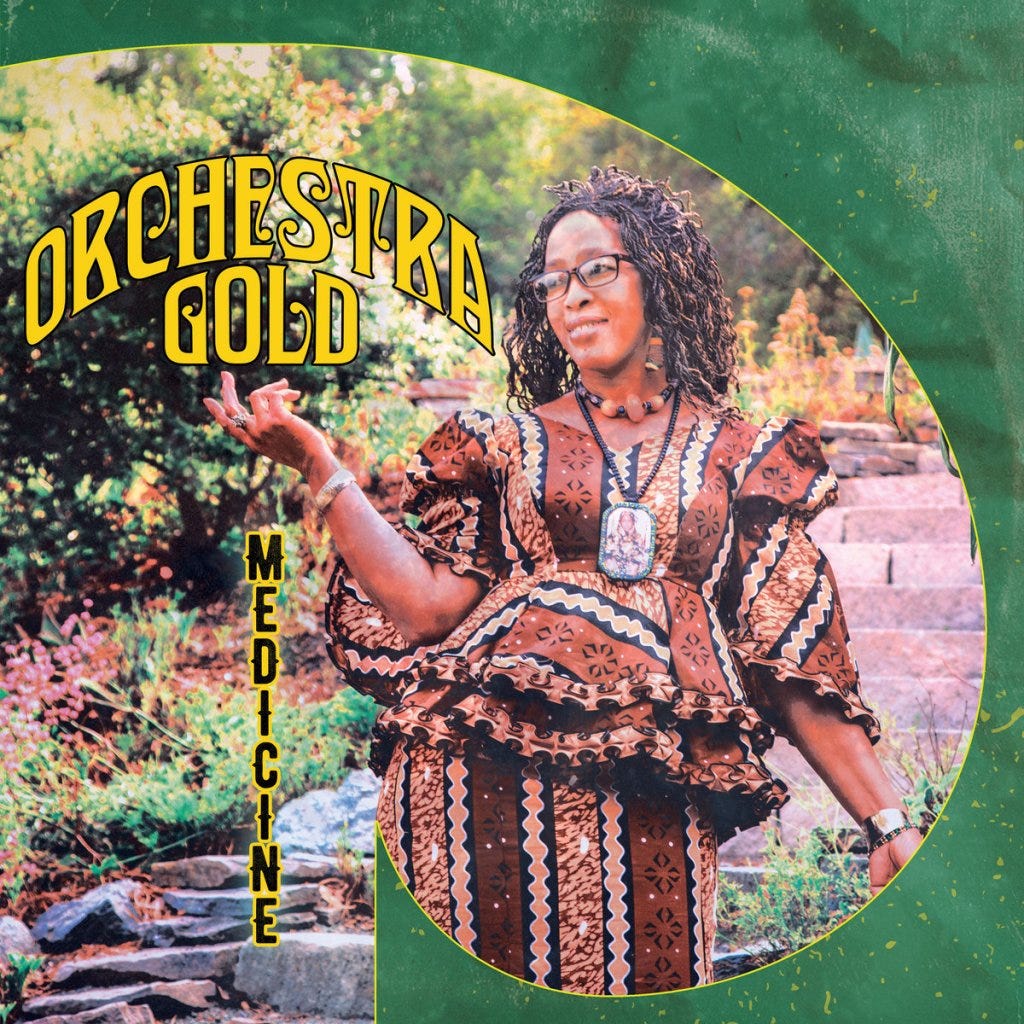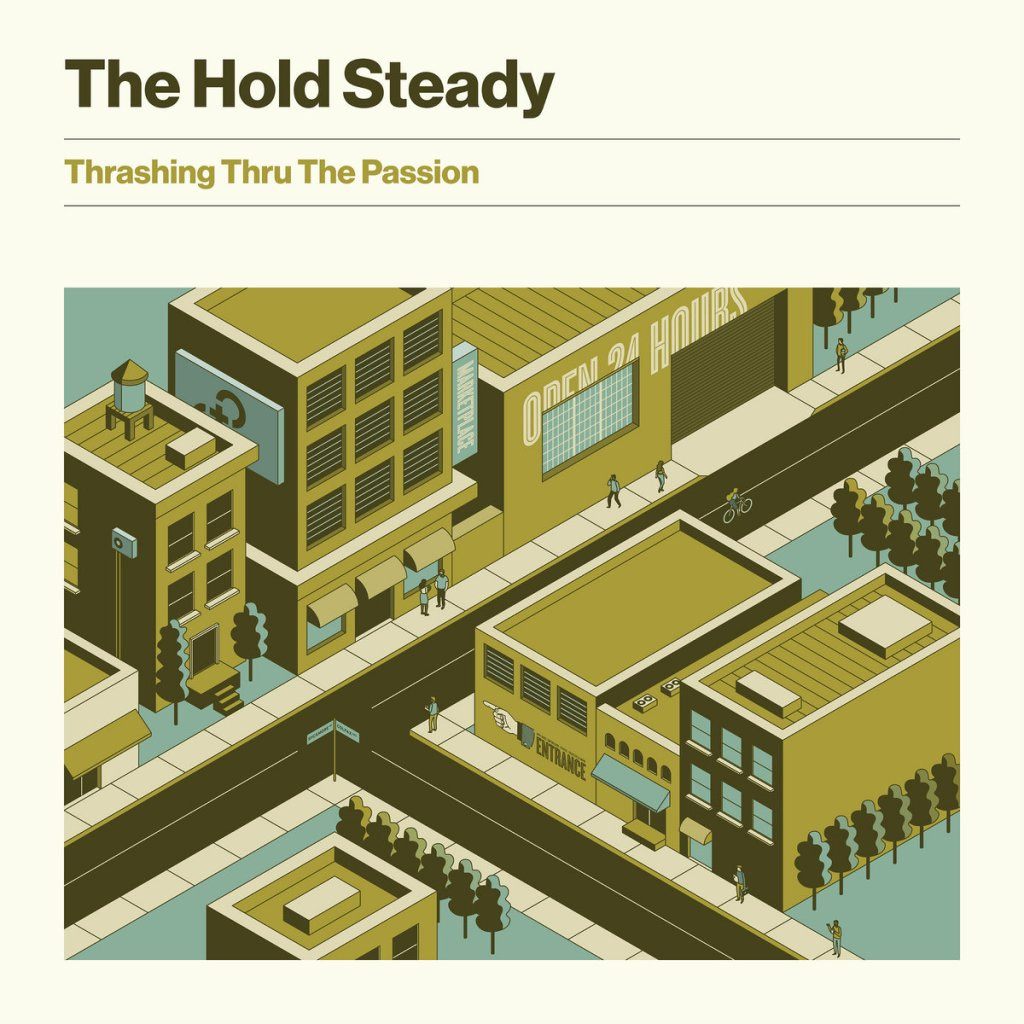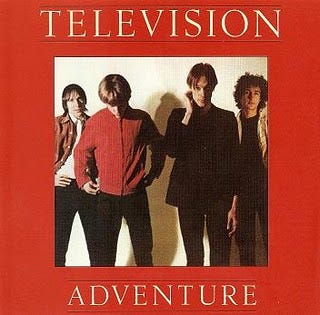THE HOLD STEADY, ORCHESTRA GOLD, AND TELEVISION (not the debut album)
For this edition, the 6OGs dive into three rock albums and artists that glide across time and space: Orchestra Gold (a band from Oakland channeling the sound of Bamako, Mali in the 1970s), the Hold Steady (a band rooted in Minneapolis channeling Bruce Springsteen and the core of New York rock and roll), and Television (a band that made its mark in the New York scene of the 1970s but sounded as if they came from another world).
New album: Medicine by Orchestra Gold. There is a mini-trope when it comes to bands from Africa or featuring African musicians/sounds that get noticed in the United States. That is, a Western non-profit worker, filmmaker, or musician goes to Africa and, lo and behold, discovers a remarkable singer or band, decides to record them on a shoestring, makes a documentary, and voila. Think of Sierra Leone's Refugee All Stars, Staff Benda Bilili from the D.R. Congo, the Zomba Prison Project in Malawi, the Good Ones from Rwanda, and on. Which is not to say the music of any of these artists is bad or illegitimate; quite the opposite is true in each case. They all deserve a close listen, but the "origin story" of how it comes to our ears in the West is, well, a bit tiresome.
Which is what makes Orchestra Gold so interesting before you even hear a note. Singer and creator Mariam Diakite came from her native Mali to Oakland, breaking away from personal and cultural grips of patriarchy to explore new musical and artistic dimensions. She had been a renowned singer and dancer in Bamako but after receiving a visa in 2018 to study in the United States, relocated to Oakland and reconnected with a former non-profit worker/friend and started a musical collective. Orchestra Gold was born and set about unpacking the traditions of Malian music, both from rural areas and the clubs of Bamako, and fusing it with a range of influences, including soul, funk, and, perhaps most enticing of all, psychedelic rock.
From the first notes of the guitars and horns on "Keleya," the opening track from Oakland's Orchestra Gold, you know you are in for a ride. But this is a ride in which you don't know exactly where you are starting from or likely to finish. The bass starts quietly, but the guitars and horns then pick up the pace almost immediately and drive you forward with a pulsing, but otherworldly, riff. Mariam then comes in, singing in her traditional Bambara language, with a simultaneous immediacy and distance that is hard to explain. The vocals are buried in the mix, but there is an additional distance that comes from not understanding the words. Mariam has explained in interviews and on Bandcamp that the Bambara language is one filled with symbolism and illusion, and the interplay of her ethereal vocals with the driving ensemble does have the exact effect of painting pictures and symbols in your head. "Keleya" is a song about jealousy, specifically in the context of polyamorous relationships, but what you take away is being transported, whether to a dingy basement club in Bamako or some other realm.
The eight tracks on "Medicine" are mostly of a piece in tempo and texture, but the third song, "Baara Nyuma," is where things slow down just a tad, and there is more room to hear the band settle into a groove and breathe, led by the interplay of baritone and tenor saxophones and an almost hypnotic guitar line underneath. Some of the band's earlier collections featured more variety and experimentation, with "Medicine" honing in on a specific feel, yet ending with "Tequila Jam," an instrumental track that doesn't quite feel the same without Mariam's vocals but yet gives you a sense of where else this band can go.
I am not sure if our immigration system will enable a new trope to develop of musicians from the continent coming to the United States to discover how American musicians can contribute and expand traditional sounds, but it would be a most welcome counter-trope if Orchestra Gold is a sense of what that would produce. (Brad)
Album from an upcoming/recent live show: Thrashing Through the Passion by The Hold Steady. “Thanks for listening, thanks for understanding.” That line comes from the chorus of “Entitlement Crew,” the standout track from The Hold Steady’s 2019 album Thrashing Through the Passion. The band adopted that phrase as a motto that symbolizes the connection they have with their extremely loyal fan base. And that connection, that energy, was in full effect at the Ottobar in Baltimore on February 2 as The Hold Steady toured to celebrate 20 years as a band.
After an initial four-album run as strong as any – Almost Killed Me, Separation Sunday, Boys and Girls in America, Stay Positive – The Hold Steady’s recorded output has seen peaks and valleys. After Stay Positive, keyboardist Franz Nicolay left the band, and the next two albums – Heaven is Whenever and Teeth Dreams – seemed lacking in comparison to the previous four despite a few solid songs (“The Weekenders,” “I Hope This Whole Thing Didn’t Frighten You”). Nicolay returned for Thrashing Through the Passion, which was an overall return to form for the band and sounded more in line with Stay Positive than the previous two albums. The follow-up, Open Door Policy, was a bit of a step back, but Thrashing Through the Passion was the album that proved that The Hold Steady still had the goods. The Hold Steady have a new album due soon called The Price of Progress (guaranteed to be covered by the 6OGs). The band released two songs – “Sixers” and “Sideways Skull” – that portend well for the new album. The former song references both the basketball team and the method of packaging beer. The latter is already part of the band’s setlist and, at the Ottobar show, “Sideways Skull” received a raucous response from the crowd and avoided the dreaded “new song bathroom break” that legacy bands often deal with.
The Charm City show jolted open with “Constructive Summer.” From there, the band played songs across all their albums except Teeth Dreams. The show had a particular emphasis on their two best, Separation Sunday (“Stevie Nix,” “Your Little Hoodrat Friend,” “Chicago Seemed Tired Last Night,” “Cruficixion Cruise,” “How a Resurrection Really Feels) and Boys and Girls in America (“Chips Ahoy,” “Stuck Between Stations,” “You Can Make Him Like You,” “Massive Nights,” “First Night,” “Hot Soft Lights”). As if those songs weren’t great enough, the band also sprinkled in older tracks like show-closer “Killer Parties,” “Barfruit Blues,” and “Sketchy Metal.” While much of the crowd sang along with every word Craig Finn uttered about Midwestern punks, drug addicts and alcoholics, everyone in the room belted out the catchy chorus to “Sequestered in Memphis.” More recent songs, such as the aforementioned “Entitlement Crew” and “The Weekenders,” nearly blew the roof off.
Just like Thrashing Through the Passion showed that The Hold Steady could still produce a great album, their Ottobar show proved that The Hold Steady are still, even after 20 years, one of the best live bands around.
Brian
Just like Thrashing Through the Passion showed that The Hold Steady could still produce a great album, their Ottobar show proved that The Hold Steady are still, even after 20 years, one of the best live bands around. Craig Finn’s lyrics and unique speak-singing style, Tad Kubler’s virtuoso guitar playing, Franz Nicolay’s essential keyboards and harmony vocals, Steve Selvidge’s rhythm guitar, and the solid rhythm section of Galen Polivka and Bobby Drake form a dynamic that their fans (including this writer) justifiably find irresistible. Without a doubt, I will be right there pumping my fist along to every “whoah!” the next time they hit the road.
Thanks for listening, thanks for understanding. (Brian)
Album being rediscovered (at least 10 years old): Adventure by Television. Chances are, Tom Verlaine was your favorite musician’s favorite guitarist. In terms of both prowess and influence, he was to the indie-rock world what Jeff Beck was to classic rock fans. I don’t know enough about technique to explain why Verlaine was so good, but I can hear the brilliance in his music, and I can read the countless tributes in the wake of his death on January 28 at age 73.
Tom Verlaine’s story is fairly well-known by this point. He came to New York in the mid-‘70s, formed a band called the Neon Boys with his then-buddy Richard Hell. The Neon Boys broke up, then re-formed as Television, after which Hell left the band (or was kicked out, depending on whose side of the story you believe). Television became a part of the ‘70s New York downtown scene, one of the first bands to play CBGB, along with the Ramones. But whereas the Ramones took ‘50s bubblegum rock in a louder, faster, outer-borough-bred direction, Television were led by Verlaine’s precision, skill, attitude, and experimentation resulting in a mixture that some started calling art-punk.
In 1977, Television released Marquee Moon, a near-perfect album that is considered among rock’s greatest and is on the short list for greatest debut albums ever. Their follow-up, Adventure, was released in 1978, after which the brand broke up. Verlaine continued writing and recording, releasing nine proper solo albums between 1979 and 2006, while Television re-formed for a third self-titled album in 1992 and continued touring periodically since then.
While Television’s debut album casts a long shadow that serves both as Verlaine’s mission statement and legacy, Adventure is a strong album in its own right, even if it fails to reach the absolute highs of its predecessor. “Days” and “Carried Away” give us the softer side of Television. “Foxhole” has Verlaine playing a catchy hook before shifting into guitar god territory. Listening to “Careful,” it makes me wonder if Verlaine was listening to 13th Floor Elevators before those CBGB shows. Album opener “Glory” and “Ain’t That Nothin’” carry over a bit of Marquee Moon’s edginess, the latter in particular highlighting the guitar interplay between Verlaine and Lloyd. Mid-tempo “The Fire” has a broad, cinematic feel, a change from the frenetic fast-paced style often associated with Television. Album closer “The Dream’s Dream” is almost Television in a nutshell – opaque lyrics and pleasant melodies interspersed with arty diversions.
Listening to “Careful,” it makes me wonder if Verlaine was listening to 13th Floor Elevators before those CBGB shows. Album opener “Glory” and “Ain’t That Nothin’” carry over a bit of Marquee Moon’s edginess, the latter in particular highlighting the guitar interplay between Verlaine and Lloyd...Album closer “The Dream’s Dream” is almost Television in a nutshell – opaque lyrics and pleasant melodies interspersed with arty diversions.
Brian
2023 is already a bad year for losing rock legends – Jeff Beck, David Crosby, and now Tom Verlaine. Of the three, Verlaine probably (sadly) has the least casual name recognition. After Verlaine’s death, a litany of accomplished and varied musicians, including Michael Stipe, Jason Isbell, Susanna Hoffs, Vernon Reid, and Nels Cline, took to social media to note his influence. And just last year, indie-pop band Alvvays included a song called “Tom Verlaine” on their album Blue Rev. This will all naturally lead people to Marquee Moon, either to rediscover it or hear it for the first time. But for those who are either new to Television and Verlaine, or returning to them after a long absence, don’t ignore Adventure. It doesn’t get the recognition of Marquee Moon, and to be fair, it is not as powerful, groundbreaking, or, simply, as good as Television’s debut. But Adventure is a very good album that deserves a reassessment and broader appreciation. (Brian)





